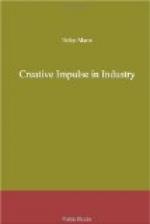Certain pupils, we will say, will elect to carry further than others the testing of fuel, of heating and ventilating. Others may be concerned with experiments in power. A subject possibly will become of such absorbing interest to a pupil that he will want to experiment with the one he elects for its own sake and without relation to the problems in the shop. His interest may carry him into pure science, unattached to any problem in hand. In such cases the pupil should be given a chance to test out his interest; he should be placed on probation in relation to his elected subject and if his interest holds and is sufficiently serious he will be advised to give up the school-shop work and follow the lead his interest has taken in some other place or school.
Indeed the value of the experiment will rest on discovering whether or not it holds the interest of the pupils, or how and where it diverts it. The experiment is launched on the assumption that the normal adolescent child is concerned with the responsibilities of adult life; especially it is assumed that he is concerned to function creatively, to associate with others in productive work, to help supply such fundamental needs as the housing, feeding and clothing and the pleasures of the world demand. It is assumed that the desire for experience in pure science, in art for art’s sake, comes before as well as after this period when the need for social contact is, it is again assumed, the dominating emotion. We have no scientific proof that any of these things are true, but we have sufficient evidence to justify an experiment.
Whether or not it is possible for modern industry to offer young people a proper chance for making their social adjustments is also a question which I hope this experiment may help to answer. We can do no less than use the conditions of industry as they present themselves to us as our basis for a trial. I have started with the belief that possibly the division of labor and scientific methods of management if handled by the workers in conjunction with engineers and people of experience can be made the instruments of associated life. If there is ground for this assumption it will be important to induce the young people who enter the school and work shop to give their industrial experience a fair trial and to postpone the pursuit of pure science or art for its own sake.
The subject matter taken up in this school can be subjected to a formal school classification, under such regular academic headings as Mathematics, Science, Economics, Geography, History, Reading, Composition and Drawing. While these subjects will be experimentally rather than academically pursued, it will be a matter of small moment and short time for pupils to makeup deficiencies which the traditional school courses require. This is true because the pupils will have had first hand experience with the subject matter in which the ordinary school child is trained or hears about. The free pursuit of their studies will give them a familiarity and speaking acquaintance with the subject matter with which the traditional school is avowedly concerned but which it handles and guards as though it were the custodian of some precious, but insubstantial matter, belonging to a world somewhat attenuated.




